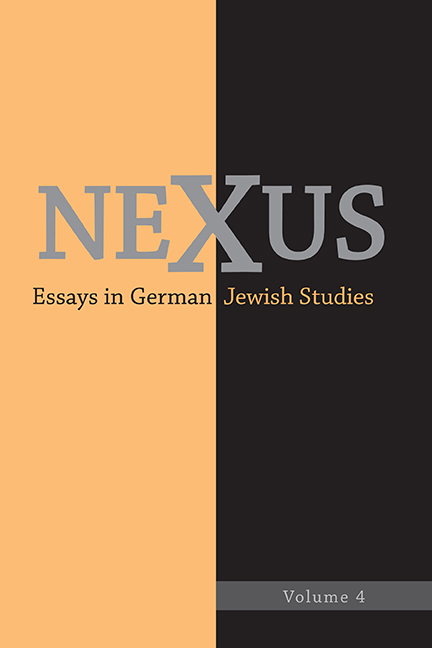Book contents
- Frontmatter
- Dedication
- Contents
- Acknowledgments
- Introduction
- Kafka, Childhood, and History
- The Black, White, and Gray Zones of Schindler's List: Steven Spielberg with Primo Levi
- Nexus Forum: A German Life: Edited and Introduced by Brad Prager
- Perspectives on A German Life
- “No False Remorse”: A Workshop with Florian Weigensamer, Director of A German Life (2016)
- Only Skin Deep
- A Brunhilde for Our Time: Eliding the Questions in A German Life
- Hitler's Helpmates
- Zooming in on Moral Guilt: A German Life as an Artistic Public Trial
- Framing the Beldame in A German Life and Blind Spot
- Special Section on George Tabori: Edited and Introduced by Martin Kagel
Framing the Beldame in A German Life and Blind Spot
from Nexus Forum: A German Life: Edited and Introduced by Brad Prager
Published online by Cambridge University Press: 31 August 2018
- Frontmatter
- Dedication
- Contents
- Acknowledgments
- Introduction
- Kafka, Childhood, and History
- The Black, White, and Gray Zones of Schindler's List: Steven Spielberg with Primo Levi
- Nexus Forum: A German Life: Edited and Introduced by Brad Prager
- Perspectives on A German Life
- “No False Remorse”: A Workshop with Florian Weigensamer, Director of A German Life (2016)
- Only Skin Deep
- A Brunhilde for Our Time: Eliding the Questions in A German Life
- Hitler's Helpmates
- Zooming in on Moral Guilt: A German Life as an Artistic Public Trial
- Framing the Beldame in A German Life and Blind Spot
- Special Section on George Tabori: Edited and Introduced by Martin Kagel
Summary
AGERMAN LIFE RECALLS an earlier documentary, Blind Spot: Hitler's Secretary (Im toten Winkel—Hitlers Sekretärin, 2002), which features Hitler's erstwhile secretary, Traudl Junge. In each film, a former secretary to a member of the Nazi elite discusses her past. Edited down from many more hours of interview footage than the final cuts reveal, both films center on the subject's face and voice, question the reliability of her belated and self-interested narration, and emphasize her contradictory, ambivalent stance toward her personal responsibility for Nazi crimes. However, Blind Spot's and A German Life's approaches to framing their subjects—beldames haunted by the specter of evil—have very different yet complementary functions. Florian Weigensamer explains that while he and the other directors of A German Life did not intend to put their film in direct dialogue with Blind Spot, they mistrusted the regret Junge expressed in that film. Weigensamer said, “we wanted our film to be different […] I didn't want the audience to visit Brunhilde Pomsel in her home. We wanted to create a space that is removed from every connection.” 1 Blind Spot encourages familiarity, even sympathy, with its subject, casting Junge's professional and personal support of Hitler as naïve, mundane error. By contrast, A German Life emphasizes critical and historical distance and calls on viewers to judge Pomsel for assisting Goebbels's work and thereby abetting Nazi crimes. Each film records valuable historical information and offers an important perspective on low-ranking accomplices in the Nazi regime. By considering these films together, we can engage the Nazi past more fully, both recognizing the essential complicity of individuals like Pomsel and Junge and understanding how easy it is for people to fall into that kind of supporting role.
Blind Spot welcomes the audience into Junge's home. The film takes place in her living room, complete with bookshelves, knick-knacks, framed photos, and artwork. Junge, in her own living room, could be a viewer's grandmother or kindly aunt. Any secretary in Munich at the time, or even today, this film suggests, might have made similar choices.
- Type
- Chapter
- Information
- Nexus 4Essays in German Jewish Studies, pp. 85 - 88Publisher: Boydell & BrewerPrint publication year: 2018

